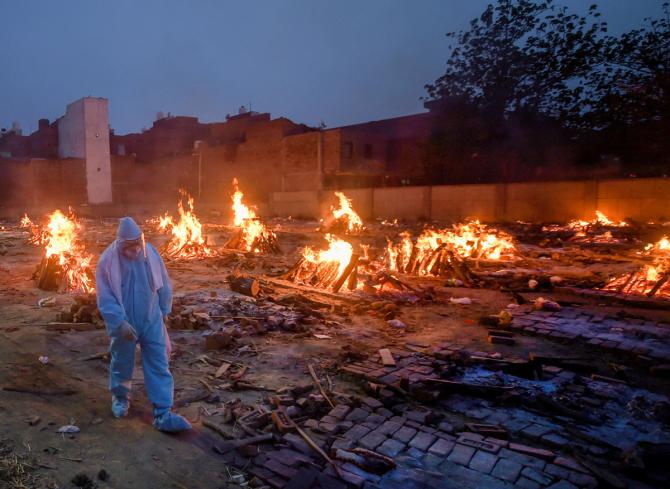In India, 11.9 lakh excess deaths occurred in 2020 during the COVID-19 pandemic, 17 per cent higher compared to 2019, an international study has found.

The estimate is about eight times higher than the official COVID-19 deaths in India, and 1.5 times the World Health Organisation's estimates, researchers, including those from the University of Oxford, United Kingdom, said.
Using data of over 7.65 lakh individuals, the study estimated changes in life expectancy at birth, by gender and social group between 2019 and 2020 in India, a country where one-third of global pandemic excess deaths are thought to have occurred, according to the authors.
The data was taken from the National Family Health Survey-5 (NFHS-5).
The life expectancy in women fell by 3.1 years, while it fell by 2.1 years in men, the authors said.
Gender inequalities in healthcare and resource distribution within households could be possible reasons, they said.
The patterns contrast with those seen in high-income countries, where excess deaths were higher among men than women during the pandemic, the authors said in the study published in the journal Science Advances.
Looking at social groups, the researchers found that high caste Hindu groups experienced a life expectancy decline of 1.3 years, whereas Muslims and Scheduled Tribes experienced a 5.4-year and 4.1-year drop in their life expectancies.
The pandemic exacerbated the disparities already faced by these marginalised caste and religious groups in terms of life expectancy, the authors said.
"Marginalised groups already had lower life expectancy, and the pandemic further increased the gap between the most privileged Indian social groups, and the most marginalised social groups in India," said first author Aashish Gupta, a research fellow at the University of Oxford.
Further, the researchers found that deaths in India increased across age groups, most prominently among the youngest and the oldest, whereas drops in life expectancy in high-income countries were largely driven by increased deaths in those aged 60 years and above.
Excess deaths among the youngest could be explained by children in certain areas being more vulnerable to the COVID-19 infection, they said.
The indirect effects of the pandemic and lockdowns, including deteriorating economic conditions and disruptions to public health services, also contributed to excess mortality in the youngest age groups, according to the authors.
"Using unique demographic and health survey data, our study highlights the importance of focussing on inequality when measuring mortality and shows that pandemics can worsen, rather than equalise, existing disparities," said author Ridhi Kashyap, a professor of demography and computational social science, University of Oxford.
"This was particularly noticeable on the role that COVID-19 had in further exacerbating the health impacts of pre-pandemic gender disparities," Kashyap said.
Reacting to the study, Ministry of Health and Family Welfare issued a statement, describing the study's estimates as 'gross and misleading'.
The study's 'untenable and unacceptable' findings are based on a methodology having 'critical flaws', the most important one being taking the mortality observed in a subset of households surveyed in the NFHS and extrapolating these results to the entire country, according to the statement.
'The NFHS sample is representative of the country only when it is considered as a whole. The 23 per cent of households included in this analysis from part of 14 states cannot be considered representative of the country,' it said.
The study fails to acknowledge India's 'robust' Civil Registration System (CRS), which recorded a substantial increase in death registrations (over 99 per cent) in 2020, up from 92 per cent in 2019, not solely attributable to the pandemic, the statement added.











 © 2025
© 2025